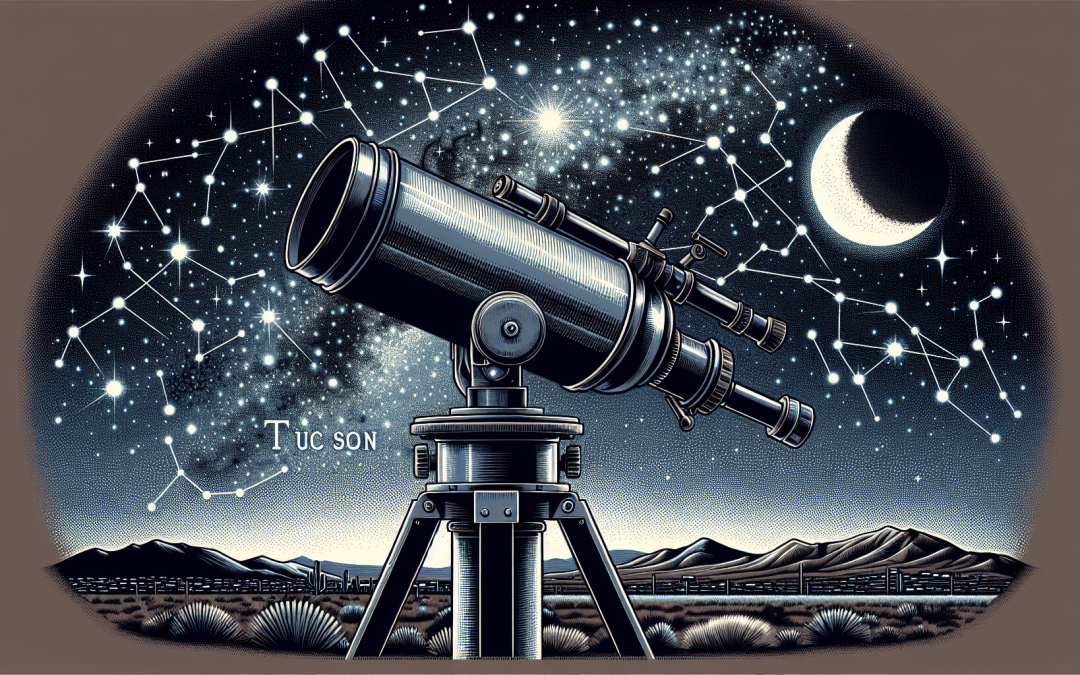So you’re wondering if Tucson is the place to be for stargazing and astronomy? Well, let me tell you, Tucson has earned quite the reputation as a haven for anyone with a celestial curiosity. With its clear skies, minimal light pollution, and an abundance of stellar attractions, Tucson has solidified its position as one of the best places on Earth to explore the mysteries of the universe. Whether you’re an amateur astronomer or a seasoned stargazer, this Southwestern city offers a myriad of opportunities to indulge in the wonders of the night sky. So grab your telescope and get ready to embark on an astronomical adventure in Tucson!
Tucson’s Unique Geographic Features for Stargazing
When it comes to stargazing, Tucson stands out with its unique geographic features that make it a prime location for astronomy enthusiasts. One of these features is the coveted Dark Sky City designation. Tucson is proud to hold this title, which is awarded to cities and towns with exceptional efforts to minimize light pollution and preserve the natural darkness of the night sky. This commitment to protecting the celestial views means that you can experience the splendor of the cosmos in all its glory.
Another advantage that Tucson offers for stargazing is its high elevation. Sitting at an elevation of around 2,400 feet, Tucson’s higher altitude allows for clearer views of the night sky. With less atmospheric interference, you’ll have the opportunity to observe celestial objects with greater detail and sharpness. This elevation advantage is a major draw for both amateur stargazers and professional astronomers alike.
Adding to Tucson’s allure as an astronomy destination, the city boasts consistently clear skies throughout the year. As a result, Tucson experiences over 300 nights of clear or mostly clear skies annually. This remarkable weather pattern significantly increases the opportunities for stargazing and astronomical research. With so many cloudless nights, you’ll have ample chances to witness mesmerizing celestial events and explore the wonders of the universe.
Astronomical Research Institutions in Tucson
Tucson is not just a city for stargazing enthusiasts; it is also a hub for astronomical research. The city is home to several world-renowned astronomical research institutions, making it an exciting destination for professionals and students of astronomy.
One of the most prominent research institutions in Tucson is the Kitt Peak National Observatory. Located about 56 miles southwest of the city atop the Kitt Peak mountain, this observatory hosts numerous astronomical telescopes and instruments. It provides a unique opportunity to engage with cutting-edge research and explore the universe through the eyes of seasoned astronomers.
Another prestigious research facility in Tucson is the Steward Observatory, which is part of the University of Arizona. The Steward Observatory is dedicated to advancing our understanding of the cosmos through its state-of-the-art telescopes and research programs. With its close proximity to other astronomical institutions in Tucson, it fosters a collaborative environment for scientific exploration and discovery.
The Planetary Science Institute, also based in Tucson, focuses on the study of planetary science and exploration. With its expertise in planetary geology, the institute plays a crucial role in research projects related to our neighboring planets and beyond. Its presence further cements Tucson’s reputation as a center for astronomical inquiry and innovation.
Public Observatories and Astronomy Education
In addition to its research institutions, Tucson offers a range of opportunities for public engagement and astronomy education. Whether you’re a novice stargazer looking to learn more or a seasoned enthusiast eager to deepen your knowledge, Tucson has you covered.
The Flandrau Science Center and Planetarium, located on the University of Arizona campus, is a popular destination for both locals and visitors. This interactive science center features engaging exhibits, a state-of-the-art planetarium, and a variety of educational programs. From captivating multimedia shows to hands-on exhibits, Flandrau offers a unique learning experience that will inspire awe and curiosity about the mysteries of the universe.
For an unforgettable stargazing experience, head to the Mt. Lemmon SkyCenter located atop the scenic Mount Lemmon. Operated by the University of Arizona, this observatory offers public night programs for stargazers of all ages. You’ll have the opportunity to peer through their research telescope and enjoy breathtaking views of the night sky with informative and engaging astronomers as your guides.
If you’re looking to connect with other astronomy enthusiasts in Tucson, the Tucson Amateur Astronomy Association (TAAA) is an excellent option. This local organization hosts regular meetings, lectures, and observing sessions, providing a welcoming community for amateur astronomers to share their passion and learn from experienced members.
Annual Astronomy Events in Tucson
The Tucson astronomy community knows how to celebrate the wonders of the cosmos with a variety of annual events that bring together professionals, amateurs, and enthusiasts from all around. These events provide unique opportunities to engage with the astronomical community, learn from experts, and experience the magic of the night sky.
The Tucson Star Party is a highly anticipated event that takes place every year, showcasing Tucson’s passion for stargazing and astronomy. This multi-day event brings together hobbyists, professionals, and families for a range of activities, including stargazing sessions, workshops, and informative presentations. The event aims to inspire and educate attendees on all aspects of astronomy while fostering a sense of community among participants.
Another noteworthy astronomy event in Tucson is the Arizona Star Party. Held in a remote location away from light pollution, this event offers unparalleled opportunities for stargazing and astrophotography. With professional astronomers on hand to guide participants, it is an excellent chance to learn from experts and deepen your understanding of the cosmos.
The Astronomy Festival of the Southwest is yet another exciting event that takes place annually in Tucson. This festival brings together astronomy enthusiasts of all ages for a weekend of educational talks, hands-on activities, and stargazing opportunities. With a focus on outreach and education, the festival aims to spark curiosity and inspire a love for astronomy in attendees of all backgrounds.
Stargazing Sites in Tucson
Tucson is blessed with a range of stargazing sites that offer exceptional views of the night sky. These locations provide picturesque settings that allow you to fully immerse yourself in the wonders of the universe.
The Mount Graham International Observatory, located in the Coronado National Forest, is a prime destination for stargazers and astronomers alike. With its high elevation and remote location, it offers unparalleled views of the night sky. The observatory hosts several telescopes, including the Vatican Advanced Technology Telescope, which is known for its groundbreaking research in astronomy and astrophysics.
For a unique stargazing experience with a blend of science and nature, look no further than Biosphere 2. This iconic research facility doubles as an otherworldly stargazing spot. Situated in the scenic Sonoran Desert, Biosphere 2 offers guided stargazing tours that allow you to explore the cosmos while also appreciating the amazing work conducted at this self-contained ecosystem research center.
Saguaro National Park, with its stunning desert landscapes and designated Dark Sky Park status, serves as an ideal stargazing site. As you gaze up at the expansive night sky, you’ll be met with a breathtaking view of countless stars, planets, and celestial objects. The park hosts occasional stargazing events, where knowledgeable park rangers guide visitors through the wonders of the universe.
These stargazing sites in and around Tucson exemplify the city’s commitment to providing exceptional experiences for those seeking celestial wonders and a deeper connection with the universe.
Stargazing Tours and Experiences
Tucson offers a plethora of stargazing tours and experiences that cater to both seasoned stargazers and curious beginners. These experiences offer a unique combination of education, exploration, and awe-inspiring encounters with the night sky.
One standout experience is SkyNights at the University of Arizona. Held at the Mount Lemmon SkyCenter, SkyNights offers a variety of programs designed to showcase the marvels of the night sky. From public observing nights to private group sessions, participants have the opportunity to observe celestial objects through powerful telescopes, learn from expert astronomers, and gain a deeper understanding of the cosmos.
If you’re looking for an immersive stargazing experience guided by passionate astronomers, Night Sky Tours in Tucson is a top choice. With their mobile telescopes and knowledgeable guides, they take you on a journey through the night sky, unraveling its mysteries and sharing their expertise in a captivating and accessible way.
For a truly unique stargazing adventure, head to Kartchner Caverns State Park. Known for its stunning underground caves, this park offers exclusive stargazing tours that take you deep into the caverns, away from any light pollution. As you gaze into the sky from this extraordinary natural setting, you’ll witness the beauty of the stars and gain a new perspective on the universe.
Tucson’s Connection to Space Exploration
Tucson’s vibrant astronomical community is further enriched by its strong connection to space exploration. The city’s involvement in various space-related endeavors highlights its significant contributions to the field of astronomy and the quest to unravel the mysteries of the universe.
The University of Arizona maintains a close partnership with NASA, making Tucson a pivotal location for space research and exploration. From designing and building advanced telescopes to analyzing data from space missions, the university’s collaboration with NASA allows for groundbreaking discoveries and advancements in our understanding of the cosmos.
Tucson’s commitment to planetary science is also evident in its numerous research projects. The city is home to the Planetary Science Research Center, where scientists and researchers study celestial bodies, their formation, and their evolution. This focus on planetary science positions Tucson as a leader in the field and attracts top talent from around the world.
Astrobiology, the study of life in the universe, is another thriving field in the Tucson area. Scientists and researchers in Tucson explore the possibility of life beyond Earth, examining the conditions and processes that may support extraterrestrial life forms. This interdisciplinary approach to astrobiology further establishes Tucson as a hub for space exploration and the quest for answers to age-old questions.
Amateur Astronomer Community in Tucson
Tucson’s vibrant amateur astronomer community provides an opportunity for enthusiasts of all levels to connect, learn, and grow their passion for stargazing. The city is home to several amateur astronomy clubs that welcome individuals of all ages and experience levels.
Tucson’s Amateur Astronomy Association (TAAA) is a prime example of the city’s commitment to fostering a strong amateur astronomer community. TAAA offers regular meetings, where members can share their knowledge, participate in workshops, and engage in observing sessions. The club’s supportive and inclusive atmosphere is perfect for both beginners looking to learn the basics and seasoned astronomers seeking camaraderie.
The Tucson area also offers excellent opportunities for astrophotography, allowing amateur astronomers to capture the beauty of the night sky. The dark skies and stunning landscapes serve as perfect backdrops for capturing awe-inspiring images of celestial objects. From wide-field shots of the Milky Way to detailed images of distant galaxies, Tucson provides ample opportunities for astrophotographers to hone their skills and produce stunning visuals.
In addition to the astronomy clubs and astrophotography opportunities, Tucson hosts various astronomy meetups and workshops. These events provide platforms for enthusiasts to come together, learn from experts, share their knowledge, and deepen their understanding of the universe.
Stargazing Equipment and Suppliers in Tucson
Tucson boasts an array of stargazing equipment shops and suppliers that cater to the needs of both amateur and professional astronomers. Whether you’re in the market for a new telescope, camera equipment, or accessories, Tucson has you covered.
Telescope shops in Tucson offer a wide selection of high-quality telescopes, ranging from beginner models to advanced professional instruments. These shops have knowledgeable staff who can guide you through the process of selecting the right telescope for your needs and budget. Some shops also offer repair and maintenance services to ensure that your equipment remains in optimal condition.
For those who want to try out different equipment before making a purchase, astronomy equipment rentals are available in Tucson. This service allows you to test various telescopes, cameras, or other accessories for a specific duration without committing to a long-term investment. Equipment rentals are especially beneficial for beginners who wish to explore different options before making a more substantial investment.
Local astronomy groups in Tucson often provide recommendations for stargazing equipment and suppliers based on their experiences and expertise. These recommendations can be invaluable for individuals who are new to stargazing and unsure of which equipment to choose.
Accommodations and Stargazing-friendly Places in Tucson
Tucson offers a range of accommodations and stargazing-friendly places that provide the perfect setting for experiencing the magic of the night sky. Whether you prefer the comfort of a hotel or the serenity of a camping experience, Tucson has options to suit every preference.
Some hotels in Tucson go above and beyond by offering observatory amenities to enhance your stargazing experience. These establishments often feature telescopes, astronomical events, and knowledgeable staff who can guide you through the wonders of the night sky. Whether you’re a guest at one of these hotels or simply visit for an evening, you’ll have access to unparalleled views and expert insights.
If you’re a camping enthusiast or prefer a more immersive stargazing experience, Tucson boasts stargazing campgrounds that promise unforgettable nights under the stars. These campgrounds provide dark skies, making it easier to observe celestial objects without the interference of light pollution. Camping in these locations allows you to fully embrace the beauty of the night sky and connect with nature in a profound way.
For those seeking a luxurious experience, Tucson is also home to ranches and resorts that offer stargazing opportunities under the vast Arizona sky. These properties often feature amenities such as dedicated stargazing areas, outdoor telescopes, and educational programs that cater to astronomy enthusiasts of all ages. Whether you’re a stargazer or simply appreciate the beauty of the night sky, these accommodations provide a memorable and enchanting experience.
In conclusion, Tucson is undoubtedly a hub for stargazing and astronomy. The city’s unique geographic features, impressive astronomical research institutions, opportunities for public engagement and education, annual events, stunning stargazing sites, and connections to space exploration all contribute to its magnetic appeal for amateur and professional astronomers alike. Tucson’s robust amateur astronomer community, availability of stargazing equipment and suppliers, as well as stargazing-friendly accommodations, make it an ideal destination for both locals and visitors seeking awe-inspiring experiences under the stars. So, whether you’re a seasoned stargazer or someone who is simply curious about the cosmos, Tucson is calling you to discover the wonders of the universe that await you in its dark skies.










